FYFA FOOTBALL PHILOSOPHY
Subscribe to our NewsletterFYFA YOUTH FOOTBALL PHILOSOPHY

It is our goal to make FYFA a program all parents and players are proud of. We believe our program will help build your child’s confidence and character, and prepare him to play High School Football.
IMMEDIATE GOALS OF OUR PROGRAM:
- To provide each player with the skills and fundamentals to play the game of football.
- To assure, to as great an extent as possible, a safe environment, both physically and emotionally, in which each player is encouraged to grow at his/her own rate.
- To teach and model sportsmanship and respect for the coaches, officials, opponents and each other, as the players learn to enjoy and respect the game.
- To expand on the above….on each team there will be a variety of skill levels. Each player needs to be fundamentally sound at the lowest skill levels, to be able to build up to the higher skill levels. At FYFA, our Coaches will take the time with beginning players to teach them the proper techniques of blocking, tackling, ball-handling, etc.
- More experienced players will benefit from this review of the fundamentals as well. As their confidence and skill level grows, the players can be taught the more advanced skills. Coaches must realize just because a skill has been presented, it doesn’t mean it has been learned.
- Players need to be taught on-the-field safety. Any player who is spearing, grabbing face masks, making late hits, or is overly aggressive and involved in dangerous play shall be removed from play.
- Players need to be treated with respect and need to feel safe emotionally within the environment. Foul language and/or demeaning behavior, on the part of coaches, parents, players or others, have no place in our program. The program is, in fact, a YOUTH program. Praise and positive reinforcement are far superior to building confidence, self-esteem and emotional maturity.
- FYFA exists for the value it can bring to the players. Our program needs to be a platform to model and develop the following:
SPORTSMANSHIP:
Fair and honorable play…to play the game to the best of their ability, knowing that losing is not the same as failure, and winning is not the same as success. Striving to win is very important, but improving on effort, skills and self-esteem are far more important. Mistakes can be made by anyone…players, coaches, referees and opponents, alike. The score of the game decides only who wins and loses that particular day, not who succeeds and fails. The win-loss record is a poor indicator of the success of a program that has been developed to build skills and sportsmanship.

RESPECT FOR EACH OTHER:
Skill and maturity levels may vary among individuals, but as a team, each player contributes value. At FYFA, we strive to teach the necessary skills so that each player can progress and grow within the competitive framework of the SAFL.
RESPECT FOR OPPONENTS:
This is a real indicator of an individual or team’s level of maturity. Players will be taught that their opponents are people with love of the game, just as they are, and should be treated as such. Garbage talk, etc. has no place in our program. Remember it’s a youth game.
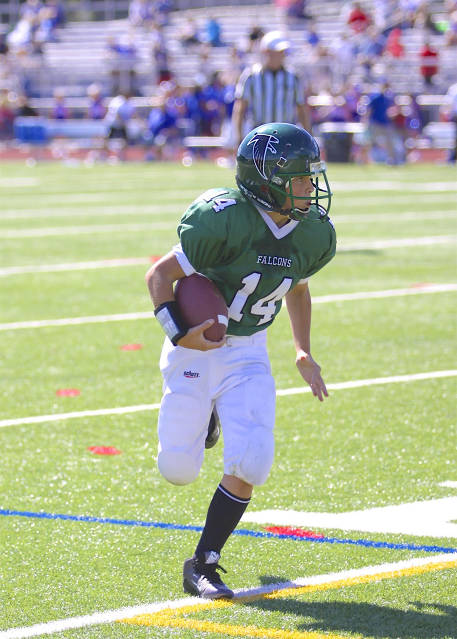
RESPECT FOR OFFICIALS AND COACHES:
Right or wrong, these people are adults and their integrity is not to be contested in front of the players. Our children have many years to enjoy sports. If we, by our example, teach them to start questioning the integrity or motives of officials and coaches, we have not served them justly. Officials are present to help assure that the game is played fairly and safely, by the rules and mutual respect shall govern our actions. Lack of sportsmanlike conduct simply will not be tolerated.
TEAM RULES
1. Keep up with your schoolwork. Poor grades in school and not completing homework will result in disciplinary actions by the coaches.
2. Come to practice prepared to work and play. Arrive on time for practices and games. Arriving on time means arriving a minimum of 15 minutes early!
3. If you don't practice, you don't play. All excused absences must be coordinated with the coaches.
4. What the coaches say goes. Back talking, profanity, bad attitudes, not completing drills or any form of disrespect will result in disciplinary action. This type of behavior will not be tolerated.
5. Respect other players. Remember, your teammates are working with you, not against you. Any unnecessary aggression or violence towards another player will result in disciplinary actions.
6. Take care of your equipment. Let the coaches know if your equipment needs to be repaired. This is key to safety.
7. No player may practice or play without the proper protective equipment, including a mouth guard. Wear your mouthpiece when required and keep a spare.
8. Learn the rules of the game. Remember especially the safety rules. Players who receive dropped flags for unsportsmanlike conduct, clipping, late hits, or other serious safety violations will have consequences.
9. Know the name of each position and understand your position.

FIELD POSITIONS:
During the first few weeks of practice, the coaches will decide the best position for each player. Vince Lombardi once said, "A good offense will win you games, but a good defense will win you championships." The coaches have put in hours of research in order to find and develop the most effective plays for this level. A player’s attitude plays a large role in the position they play. The player who has a bad attitude, who is oversensitive or who demonstrates any sort of problem with the position will be passed over. A negative attitude is costly.
When selecting starting players, attitude and desire win over ability every time. “Can't” has no place on this football team. If you wish to play a particular position, then make an effort to know that positions’ responsibilities. We may give you the chance to earn any position on the team. Make certain you do not neglect your assigned position while you are learning the new one!
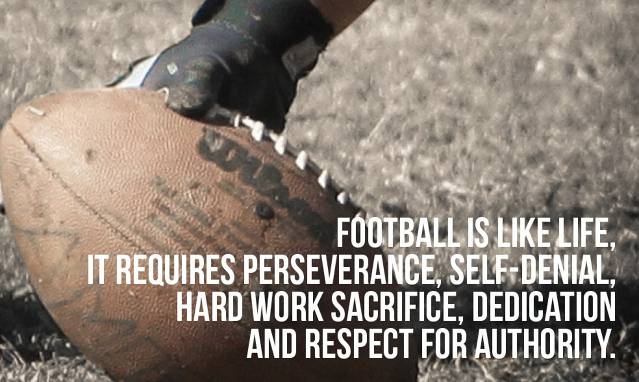
WINNING:
Nothing in life, including football, is worthwhile unless you enjoy it and gain something from the experience. Yes, we are trying to win football games and we are going to set our goals high, but it shouldn't ruin our lives if we lose. Our football team should not believe that a football loss is a tragedy. All you can ask of our players is to do their best. If we win, great! If we lose, there will be another game. Coaches that think only of winning don't belong in football. Try this: ask your child if he had a good time instead of whether he won or lost.
By the same token, we feel that we owe it to the players to do everything we can to make them winners. We plan to win every game because if you don't, then you need to ask yourself which game you plan to lose and if you're planning to lose, then why show up or practice the week before? We are going to practice hard, we are going to play hard and our scores will reflect this.
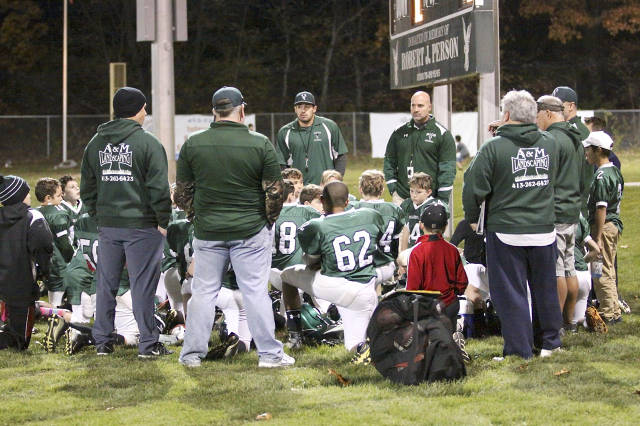
COACHES:
We view coaching as a great responsibility. Your coaches will:
- Get the players in shape
- Try to understand each player's potential
- Work on individual skills for each position
- Work on team execution of plays
- Motivate, communicate, and lead
- Teach the players the skills they need to play football safely. Coaches must have the freedom to develop three things in their athletes: pride, poise and self-confidence
They may use the following steps to instruct the game of football:
- Explain what is required
- Demonstrate the technique
- Have the player perform the technique
- Explain the consequences of not performing the technique properly
ROLE OF PARENTS:
Parents are as important to the success of the team as the players. Coaches and parents need to work together to make the program a success. Please keep coaches informed about problems that may be going on with your child. If the child has been sick, taking medication or going through some emotional trauma please let the coach know.
Please make every attempt to have your child at all practices and games on time. Bring your family and friends to your child’s game and watch them develop through the season. They work very hard and look for your support and interest in what they do.
Parents and coaches must communicate with mutual respect. Parents and coaches reserve the right to postpone conversations that are getting out of hand. Heated discussions have no place in front of the players. Please respect the 24 hour rule.
Although many parents have coaching experience and may have played on a higher level than the current coach of the team, the coaches must ask that you refrain from coaching your children at home. These children are being taught to play as a team, each player performing a set function that his teammates can rely on. A player who abandons his teammates to do something his parents coached him to do is letting down his team, his coaches and himself. At best, he may open up the door for the opponent to win the game; at worst, he may cause himself or a teammate to be injured. If you have suggestions or ideas, please do not hesitate to present them to the coaches after any practice or call your head coach.
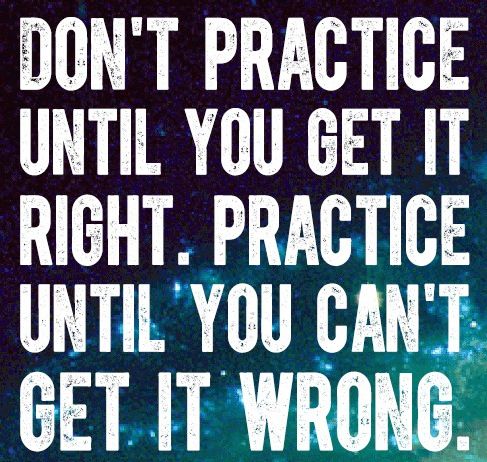
PRACTICES:
Every week practices are different. New skills are learned, problem areas are corrected and new plays are taught. Your child will be at a disadvantage by not making practice on time and regularly. Your head coach will provide you with days/times that they will conduct practice. It is generally four days a week until school starts. Once school is in session, practices are held three-four days per week with a game day either Friday or Saturday or Sunday.
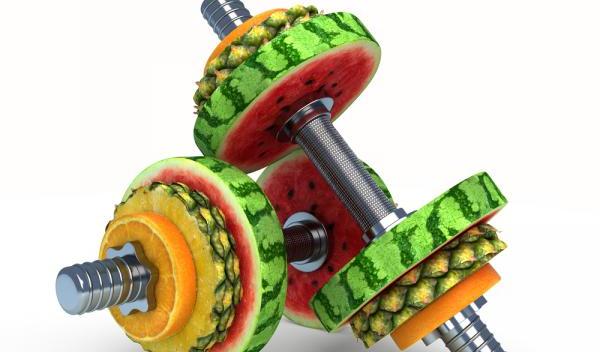
HOME CONDITIONING:
Proper nutrition and hydration is very important to a young football player. Players need to drink as much water as possible every day; at least 4 to 6 glasses. Heat stroke is always a danger despite cooler weather during fall, so it is very important to stay hydrated at all times. It is also recommended that players wear a T-shirt under their pads and Jersey to help keep them warm during the colder practices and games. Players need a high carbohydrate diet with plenty of fruits and vegetables and few fats and sugars. Please encourage healthy eating habits in your children not only during football season but the off season as well.
The FYFA web site has links to safety, hydration and nutrition information. Please access those materials if you and your player need more information on these issues.




